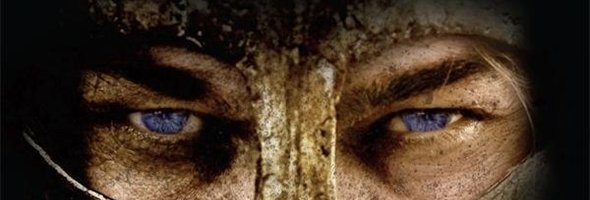Everybody knows the name, but who was Spartacus really? Before he was a legend, before he was the leader of a slave rebellion, before he was even a gladiator, who was the man? That's the question Spartacus: Blood and Sand attempts to answer. That being said, don't come expecting too much realism or historical accuracy, because this is a show where people leap 20 feet through the air and decapitate people using only a chain and some gumption. Created and exec produced by former Whedon-verse writer Steven DeKnight, Starz's surprise hit Spartacus: Blood and Sand introduces us to an unnamed Thracian long before he becomes the myth and is given the name we all know him by. We see how he joins and is subsequently betrayed by a Roman commander named Claudius Glaber (Craig Parker), and how he is sold into slavery as a gladiator in the ludus (gladiatorial school) of Batiatus (John Hannah). After Spartacus unexpectedly survives the fight that was meant to be his execution, Batiatus makes him a deal: earn glory as a gladiator, and Batiatus will do his best to reunite Spartacus with his wife. But as Spartacus' fame grows in the arena, he begins to plan more than just a life spent spilling blood for his master, putting him on course for the destiny we all know is coming.
First, the large, ugly elephant in the room. It would be remiss of me to go any further without mentioning the sad news that broke yesterday: series star Andy Whitfield, who had earlier this year been diagnosed with Non-Hodgkin's Lymphoma, has been forced to quit the series after a recurrence in order to undergo more aggressive treatment. Here's hoping Andy makes a swift and complete recovery, because the talent he's displayed thus far leaves no doubt he has a promising career ahead of him. As a fellow cancer survivor myself, I'm beaming every positive wish toward him and his family. Stay strong, brother.
Blood and Sand is best described as a sort of crazy hybrid of HBO's excellent Rome and the movie 300. The creators often say they were going for a "graphic novel" feel, so the action is bloody and over the top. No one in this show is simply stabbed and falls over; they die with a fountain of blood arcing from their neck stump, or with their face demolished against a tile floor. The battles both within and outside of the arena are artfully choreographed and make extensive use of slow motion, but not so much that it becomes tiresome. You will, however, gain enormous respect for Andy Whitfield's vocal chords, because it's hard to keep track of the number of times we get a slow-motion shot of him letting out a primal scream while his foe's viscera somersault through the air. The show makes extensive use of green screens, allowing the crew to give the world a painterly look of exaggerated realism -- it's never cartoonish or silly, but neither does it look like a PBS costume drama.
The comparisons to Rome come from what occurs outside the arena, because even the most artful violence soon becomes tedious if it doesn't have anything to break it up. Thankfully, DeKnight and his team have crafted a fascinating and compelling vision of Rome: crude, violent, and rife with corruption. The show's structure takes on a sort of "Upstairs, Downstairs" structure, split between the struggles of the gladiators and the political scheming of Batiatus and his equally devious wife, Lucretia (Lucy Lawless). Initially despised as unworthy, Spartacus soon begins to earn the reluctant respect of the other gladiators as he wins victory after victory. But even as Spartacus experiences the highs of the crowd's adoration, he's also reminded that he is property, nothing more -- if his death becomes more profitable than his life, it will be demanded by Batiatus without hesitation, a bitter truth that is hammered home mid-way through the season in one of the show's most emotionally savage scenes. Meanwhile, Batiatus spends his time angling for political office while Lucretia enters into a love-hate friendship with Illithyia (Viva Bianca), the wife of Claudius Glaber, in the hopes of riding her coattails toward higher social standing. While the bloody action in the arena is thrilling, it is Batiatus and Lucretia's web of lies, double-dealing, and betrayal that makes for some of the season's most addictive entertainment. By the time the finale rolls around, you'll likely need a spreadsheet to keep track of who has betrayed/slept with/allied with whom. It's soap opera by way of Shakespeare, and I mean that as the highest compliment possible.
DeKnight and company's stellar writing is supported on all fronts by a capable and talented cast. As mentioned above, Andy Whitfield anchors the show as the lead character. Whitfield is one of those actors who can speak volumes with just his eyes, and he imparts Spartacus with a vulnerability and sadness that makes him immediately appealing and sympathetic. For Hannah and Lawless's parts, they dig into their roles with gleeful abandon. During one of the commentaries, DeKnight says that "no one can play getting screwed better than John Hannah," and that's absolutely true. His continuous frustration with the slights of his "betters" -- whether real or perceived -- never cease to be entertaining. He also takes swearing to levels not seen since Ian McShane introduced the world to Al Swearengen in Deadwood. Viva Bianca elevates passive-aggressive bitchiness to an art form as Illithyia, perfectly portraying the casual selfishness and lack of empathy of an aristocratic Roman noblewoman who can imagine no other life. I could go on for paragraphs here, because there simply isn't a weak spot anywhere in the cast: Spartacus' rival Crixus (Manu Bennett), who soon becomes a figure of tragic romance; Varro (Jai Courtney), Spartacus' only true friend in the ludus; Erin Cummings as Sura, who convinces us with only a few scenes that she's worthy of Spartacus' unwavering devotion.
And then there's the eye candy. Blood and Sand is a visual treat on all fronts, from the strangely poetic fight scenes to the lush and detailed costuming and production design...all the way down to the cast themselves, who are on full display. And by "full display," I of course mean "really, really naked." The show embraces its nature as entertainment for grown-ups, and has a lot of fun pursuing Starz's expressed desire to push the envelope as a network. After all, if you've got a cast this good looking, why not make use of it? Much of this is used to hammer home the coarse nature of Roman society at the time, with social functions culminating in orgies and Batiatus casually screwing his way through the household servants. We even learn, in one of the funnier moments of the series, that Batiatus and Lucretia aren't above subcontracting their foreplay. Suffice to say, there's a whole lot of sickeningly gorgeous people in this show, and you'll be able to see as much of them as you care to. On this front, Blood and Sand proves itself to be one of the most egalitarian shows around, because the fellas drop their loincloths just as often as the ladies, if not more so.
One final note: the show's pilot episode is by far its weakest. DeKnight admits as much during the commentaries, explaining that it took them a few episodes to truly find their footing and the right balance between the show's more extreme elements and its narrative. But trust me, the series that follows is well worth sticking with it through the uneven first hour. First off, if you have a Blu-ray player, don't even consider buying the regular DVD version of this set. Blood and Sand is a stunning show, and it absolutely begs to be seen in high definition. From the colorful and detailed costumes, to the brutal ballet of combat, to the ripped and glistening physiques of the cast, this is one gorgeous show. The picture on these discs often rivals the best feature-film Blu-rays I've seen.
Nor does the set scrimp on the bonus features. About half the episodes have commentaries, split about evenly between DeKnight, various directors and producers, and the cast in assorted combinations. Everyone has an easy chemistry with each other, making for fun, flowing chatter that entertains as well as informs. DeKnight is never afraid to be candid about what he thinks worked well and what didn't, especially during the pilot episode, which he admits isn't as strong as he intended it to be. Anyone who listens to commentaries on a regular basis has a pretty good idea of what goes into making films and television by this point, but all involved make these commentaries well worth a listen even if they don't drop any bombshells on you.
Nearly a dozen short featurettes examine every possible aspect of production, and often do so in a light-hearted manner that makes them far more enjoyable than your standard-issue publicity package. The sense of humor is even evident in several of the featurettes' titles, from "Oh, Those Randy Romans" to the kinda-sorta blooper reel dubbed "Exposing Your Ludus." Anyone curious about how the cast got those six-pack abs will want to check out "Gladiator Boot Camp," and anyone wishing to see Whitfield and Courtney completely undercut their aura of masculinity should check out the hilarious "Grime and Punishment," which features the actors climbing into a pit of goop and giggling like teenage girls. Finally, the episodes also feature pop-up history factoids if you'd like to bone up on history in between the cast boning each other or breaking people's bones.
If you're a fan of the show, this is a must-buy. If you're not, this is a perfect excuse to check out one of the best new shows of the last year.
I Thought Elsbeth's Bloody Judge Crawford Twist Had To Be A Fake Out, But Now I Have Questions For The Season 2 Finale
A24’s The Legend Of Ochi Hired A YouTuber Making Bird Sounds In His Basement To Work On The Movie, And I'm Wowed By The Whole Process
Charli XCX Is Not Going To Be In Greta Gerwig's Narnia Movie After All, But I'm Psyched That We're Still Getting A Barbie Reunion Thanks To New Casting











